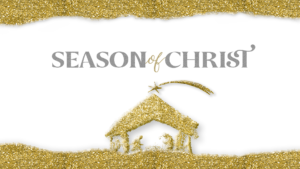Feb 13, 2022
“Anchor of the Soul”
By: Jordan Moody
Series: Hebrews

Anchor of the Soul
February 13, 2022
- Name some Old Testament saints, other than Abraham, who demonstrated faith and patience in God’s promises? How might we imitate them today? (Heb. 6:12; Heb. 11)
- What is the promise being talked about in Hebrews 6? Look at Genesis 22:15-19. How does this promise/covenant/blessing apply to us today? (Context: Gen. 15:5-6; Gen. 17:5-8)
- Share an experience when hope has been an anchor for your soul?
- What does it mean for Christ to be our forerunner?
- Extra Credit: Who is Melchizedek and why is he mentioned so much in Hebrews 5,6,7? (Heb. 5,6-7; 6:20; 7:1-17)
WatchNotesDownloadDateTitle
- Feb 13, 2022“Anchor of the Soul”
Feb 13, 2022“Anchor of the Soul”By: Jordan MoodySeries: Hebrews
 Anchor of the Soul February 13, 2022
Anchor of the Soul February 13, 2022- Name some Old Testament saints, other than Abraham, who demonstrated faith and patience in God’s promises? How might we imitate them today? (Heb. 6:12; Heb. 11)
- What is the promise being talked about in Hebrews 6? Look at Genesis 22:15-19. How does this promise/covenant/blessing apply to us today? (Context: Gen. 15:5-6; Gen. 17:5-8)
- Share an experience when hope has been an anchor for your soul?
- What does it mean for Christ to be our forerunner?
- Extra Credit: Who is Melchizedek and why is he mentioned so much in Hebrews 5,6,7? (Heb. 5,6-7; 6:20; 7:1-17)
- Feb 6, 2022“The Dark Side and the Bright Side”
Feb 6, 2022“The Dark Side and the Bright Side”By: Jordan MoodySeries: Hebrews
 HEBREWS | Hebrews 6:4-12 The Dark Side and the Bright Side February 6, 2022
HEBREWS | Hebrews 6:4-12 The Dark Side and the Bright Side February 6, 2022- Read and review the parable of the sower (Matt. 13:1-9; 18-23) and compare it to the message Hebrews 6:4-8. Discuss.
- How do you personally resonate with the content of the message given in Hebrews 4:4-8?
- How can we be sure of better things for ourselves and our church community today? (Heb. 6:9)
- From your life experience, how have you seen both “faith and patience” as instrumental to the Christian walk? (Heb. 6:12)
- How is hope also a major part of persevering in the Christian life? (Heb. 6:11; 18-19)
- What do we do now with this message?
- Jan 30, 2022“Spiritual Toddlers”
Jan 30, 2022“Spiritual Toddlers”By: Jordan MoodySeries: Hebrews
 HEBREWS | Hebrews 5:5-6:3 Spiritual Toddlers January 30, 2022
HEBREWS | Hebrews 5:5-6:3 Spiritual Toddlers January 30, 2022- How did you hear God’s voice this week from his Word and in what ways can we actively seek to avoid being “dull of hearing?” (Heb. 5:11)
- In what ways is Jesus the perfect “source of eternal salvation?” (Heb. 5:9)
- What does it mean to mature spiritually from milk to meat. Discuss: (1 Cor. 3:1-3; Eph. 4:11-14; Heb. 5:12-13)
- If we are going to graduate from the elementary doctrines, we will no doubt need help from one another. Are you discipling someone right now to go on to maturity? Or would you like to be discipled by someone else? Consider what discipleship is and what it could look like in your life. Talk about ways in which you could practically make this happen.1
- Jan 23, 2022“The Sword and the Priest”
Jan 23, 2022“The Sword and the Priest”By: Jordan MoodySeries: Hebrews
 HEBREWS | Hebrews 4:12-5:10 The Sword and the Priest January 23, 2022
HEBREWS | Hebrews 4:12-5:10 The Sword and the Priest January 23, 2022- What was your takeaway from the message this week?
- How specifically is the word of God — Living? Active? Sharper?
- How is Jesus a better high priest for us? (Review Leviticus 16; Heb. 7:22-28; Matt. 27:50-51, Heb. 4:14-16)
- The author moves from warning us “to fear” in Hebrews 4:1 to telling us to “draw near” with “confidence” in Heb. 4:16. What can we learn from this?
- Jan 16, 2022“God’s Rest”
Jan 16, 2022“God’s Rest”By: Jordan MoodySeries: Hebrews
 HEBREWS | Hebrews 4:1-11 God’s Rest January 16, 2022
HEBREWS | Hebrews 4:1-11 God’s Rest January 16, 2022- Review Numbers 13-14 for the context of Hebrews 3:15-4:1. What’s going on and what’s the point being made?
- What would it look like for us to trust in God and rest in him instead of wander in unbelief? Any examples?
- Why is belief so important to enter God’s rest?
- How does the Parable of the Sower in Matthew 13:20-21 relate to Hebrews 4 and this message?
- Why would the author tell us to “fear” in Heb. 4:1?
- The Greek word in verse 9 for “Sabbath rest” is very unique and different from the other mentions of rest in Hebrews chapter 4. Why do you think that is? What’s the author saying by not just saying “rest” but saying “Sabbath Rest?”
- Jan 9, 2022“Jesus is Better Than Moses”
Jan 9, 2022“Jesus is Better Than Moses”By: Jordan MoodySeries: Hebrews
 HEBREWS | Hebrews 3:1-19 Jesus Is Better Than Moses January 9, 2022
HEBREWS | Hebrews 3:1-19 Jesus Is Better Than Moses January 9, 2022- What are your impressions of the letter of Hebrews so far? What have you taken away from chapters 1-3?
- What makes the letter of Hebrews unique?
- Why is it so significant that Jesus would be compared to Moses and in what ways is he actually better? (Numbers 12:6-9; Hebrews 3:1-6)
- Hebrews 3:7-11 is a quote from Psalm 95:7-11 which references the context of Meribah in Numbers chapter 20. What’s going on in Numbers 20:2-13 and why is this example given in Hebrews 3?
- How can we “exhort one another?” (Heb. 3:13) Why is this so important and what’s at stake if we neglect this duty to one another?
- Take notice of the theme of belief and unbelief in this study (Belief: Heb. 3:12,19; Num. 20:12). Why is “belief” so central to Christianity and really all of life?
- Jan 2, 2022“The Good Shepherd” Part 2
- Dec 26, 2021“We See Him”
- Dec 19, 2021“Fall on Your Knees”
- Dec 12, 2021“Jesus is Better”
- Nov 28, 2021“The Good Shepherd”
Nov 28, 2021“The Good Shepherd”By: Jordan MoodySeries: Psalm 23
 Sermon Note Questions The Good Shepherd | Psalm 23 #Advent | November 28, 2021
Sermon Note Questions The Good Shepherd | Psalm 23 #Advent | November 28, 2021- Review the sermon outline for Psalm 23 below. Which ones stuck out to you most and why?
- What does the image of a shepherd communicate about God and about ourselves?
- What do you think is being fully communicated by the phrase “I shall not want?”
- Find all the places God’s presence is mentioned in Psalm 23.
- The same God is with us beside still waters and in the shadow of death. What does this teach us about God, ourselves and everyday life?
- Compare Psalm 23 and John 10. Who is the Good Shepherd and what is he like?
SERMON OUTLINE 1.SHEPHERD The LORD is my shepherd. 2.PRESENCE I shall not want 3.REST He makes me lie down in green pastures. He leads me beside still waters. 4.REFRESH He restores my soul. 5.MAP He leads me in paths of righteousness for his name’s sake. 6.SHADOW Even though I walk through the valley of the shadow of death 7.COURAGE I will fear no evil, for you are with me; your rod and your staff they comfort me 8.FEAST You prepare a table before me in the presence of my enemies you anoint my head with oil my cup overflows 9.CHASE Surely goodness and mercy shall follow me all the days of my life 10.HOME And I shall dwell in the house of the LORD forever. - Nov 21, 2021“Prayer and Partnership”
Nov 21, 2021“Prayer and Partnership”By: Jordan MoodySeries: The Center of All Things
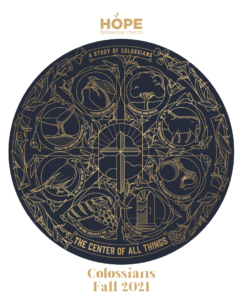 Sermon Note Questions Prayer and Partnership | Colossians 4:2-18 #CenterofAllThings November 21, 2021
Sermon Note Questions Prayer and Partnership | Colossians 4:2-18 #CenterofAllThings November 21, 2021- What would it look like for you to devote yourselves to prayer? Be specific.
- Why do you think Paul gives these specific final instructions to the Colossians to close out his letter? (Col. 4:2-6)
- Go through the “credits of Colossians” in Col. 4:7-18 as a group listing the people as you go and examine why you think Paul lists them? What can today for our own church ministry with Paul’s partnerships in gospel ministry?
- Looking back through the series in Colossians: Center of All Things, what is your main takeaway or what stands out to you the most from this letter to the Colossian church?
- Extra Credit: Onesimus is mentioned in Colossians 4:7. Read the letter of Philemon. What names do find are listed in both Colossians and Philemon? And what is going on between Paul, Onesimus, and Philemon? What do we learn from the way Paul treated each person?
- Nov 7, 2021“Clothed With Virtue”
Nov 7, 2021“Clothed With Virtue”By: Jordan MoodySeries: The Center of All Things
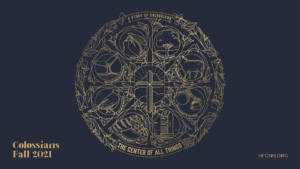 Questions for small groups or personal study. Clothed With Virtue | Colossians 3:12-17 #CenterofAllThings November 7, 2021
Questions for small groups or personal study. Clothed With Virtue | Colossians 3:12-17 #CenterofAllThings November 7, 2021- What similarities do you find in Col. 3:12-17 and Ephesians 4:22-24; 31-32?
- Where do you see the “see-saw” in Paul’s teaching again in this passage? (identity to lifestyle and back and forth)
- Is verse 13 easy or difficult to follow? Why?
- Why should we “above all” other things choose to put on love? Why love?
- Thanksgiving is a major theme here but why? (attitude of gratitude)
- Notice how Paul doesn’t lists rules or laws in this passage; but he does give direction and ideals. Read the following quotes and discuss how they shed light on this passage. “We are not shaped by rules, we are shaped by a Ruler. And “We are not taxpayers with rights, we are sinners saved by grace.” — Mark Meynell
- Oct 31, 2021“Vice Versa”
Oct 31, 2021“Vice Versa”By: Jordan MoodySeries: The Center of All Things
 Questions for small groups or personal study. Vice Versa | Colossians 3:1-11 #CenterofAllThings October 31, 2021
Questions for small groups or personal study. Vice Versa | Colossians 3:1-11 #CenterofAllThings October 31, 2021- What has already happened to believers and will happen to believers in the future according to Colossians 3:1-4? (Justification,sanctification,glorification)
- What does it mean to “set your mind on things above?” And how is this done practically? What dangers do we want avoid with the heavenly vs earthly comparison?
- Compare Colossians 3:5-10, Ephesians 4:20-24. What is meant by the process of Put off, Put On, Renew? And how is this worked out? (Rom. 8:13)
- Why do you think Colossians 3:11 so important to this passage? What’s it saying? Why is it important we don’t show partiality or discrimination in the church community especially when it comes down to sin and sanctification? What is the role of honesty, authenticity and vulnerability in this growth process of putting off sin and putting on Christ?
- Oct 24, 2021“Escape The Shadows”
Oct 24, 2021“Escape The Shadows”By: Jordan MoodySeries: The Center of All Things
 Questions for small groups or personal study. Escape the Shadows | Colossians 2:16-23 #CenterofAllThings October 24, 2021
Questions for small groups or personal study. Escape the Shadows | Colossians 2:16-23 #CenterofAllThings October 24, 2021- What’s your main takeaway from the sermon?
- What are the shadows and what is the substance? (Col. 2:17; Heb. 10:1)
- How have you experienced the two main points, “Don’t be judged by legalists” and “Don’t be disqualified by mystics,” How did Jesus experience and deal with them?
- Why is the metaphor of viewing Christ as the Head of the body, the church, so important? What can we infer from the images of a head, body, ligaments, joints and growth etc.? (Col. 2:19 / Eph. 4:15-16)
- In 2 Corinthians, Paul does a little role playing, pretending almost to act like a “super-apostle” to point out the foolishness of self-centered boasting. Examine his message to the Corinthians and compare it to what he says to the Colossians about Christ as the Head and the Center versus the false teaching of the legalists and mystics. (Look at 2 Corinthians 11-12, particularly on 2 Cor. 11:12-12:10. I know its a lengthy passage but it helps to see his whole flow of thought and what he really ends up boasting in at the end.)
- Oct 17, 2021“In Christ Alone”
Oct 17, 2021“In Christ Alone”By: Jordan MoodySeries: The Center of All Things
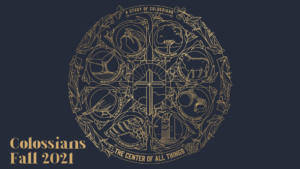 Questions for small groups or personal study. In Christ Alone | Colossians 2:6-15 #CenterofAllThings October 17, 2021
Questions for small groups or personal study. In Christ Alone | Colossians 2:6-15 #CenterofAllThings October 17, 2021- What’s your main takeaway from the sermon?
- Why do most say Col. 2:6-7 the main thesis statement for the entire letter? What is Paul saying here?
- How do you see what Paul mentions as threats to the foundation of the christian life as still relevant today? ([verse 8] threats that can take you captive: philosophy and empty deceit, human tradition, elemental spirits, things not according to Christ)
- Jesus + Nothing. What does that mean? How and why does Paul teach this in 6-15?
- Look through and discuss each place Paul uses the phrases “in him” or “with him” in Colossians 2:6-15. What does it mean to be “in Christ?”
- Oct 10, 2021“Job Description of a Christian Minister”
Oct 10, 2021“Job Description of a Christian Minister”By: Jordan MoodySeries: The Center of All Things
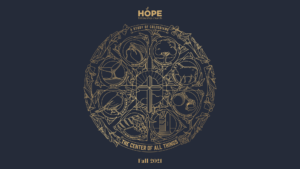 v
Questions for small groups or personal study.
Job Description of a Christian Minister | Colossians 1:24-2:5
#CenterofAllThings October 10, 2021
v
Questions for small groups or personal study.
Job Description of a Christian Minister | Colossians 1:24-2:5
#CenterofAllThings October 10, 2021
- What’s your main takeaway from the sermon?
- Which of the points from the sermon outline below stuck out to you the most? and why?
- How does this sermon and message apply to you even though you may not be a full-time minister or pastor? What part do you play in this?
- In 1:28, what does Paul mean by stating his goal to “present everyone mature in Christ?” How is the Christian life one of maturing and growing? (microwave or crockpot) Compare Eph. 4:11-14; Phil. 3:13-14; Col. 1:28.
- Paul says he has a great struggle for them and then goes on to list words of his prayer for them and the church at Laodicea. Examine his prayer and discuss what he prays for. (Col. 2:1-3)
- Oct 3, 2021“Paramount”
Oct 3, 2021“Paramount”By: Jordan MoodySeries: The Center of All Things
 Questions for small groups or personal study. Paramount | Colossians 1:15-23 #CenterofAllThings October 3, 2021
Questions for small groups or personal study. Paramount | Colossians 1:15-23 #CenterofAllThings October 3, 2021- What’s your main takeaway from the sermon?
- What do these passages have in common and why? Col. 1:15-20; John 1:1-5; 1 John 1:1–3; Heb. 1:1–4
- Why is it so important that Jesus is not a created being and is transcendent above all things and yet also took on flesh and dwelt among us? Why do you think this so crucial for our reconciliation and redemption?
- Look at and discuss the two slides describing the “mythological worldview” and the “biblical worldview.” What is the difference between the two and what do you think this means? (the slides were used during the service and are posted online)
- How can we remain “stable and steadfast” in these things and continue to keep Christ as the center of all things in our life and the life of our church? (1:23)
- Sep 26, 2021“Praying For You”
Sep 26, 2021“Praying For You”By: Jordan MoodySeries: The Center of All Things
 Questions for Small Groups and Personal Study
I’m Praying For You | Colossians 1:9-14
#CenterofAllThings September 26, 20211.Share with the group one main takeaway from the sermon. What impacted you or stuck out to you? 2. Share with the group a time when prayer became an essential part of your life, either you prayed for others or others prayed for you? 3.What should “I’m praying for you” really mean in a church community? 4. Look at and review the content of Paul’s prayer in Col. 9-14. What does he pray for specifically? How is his prayer similar or dissimilar from our own prayer lives or prayer habits? 5. Verse 9 uses words like “knowledge, wisdom and understanding” and then ties those words to a physical walking and outward lifestyle that is pleasing to God. What is the connection between our knowledge of God and our daily lifestyle? What is the danger of disconnecting knowledge and understanding of God from our lifestyle and ethics? 6.Paul says a life fully pleasing to God is a life “bearing fruit, increasing in knowledge, being strengthened with power, and giving thanks.” How do these phrases describe an overview of a truly Christian life? In what ways do you see or you would like to see this being worked out in your own life? Spend some time in prayer. You could have each person pray for 2 or 3 specific things. You could try praying some of the exact words and phrases Paul uses in Colossians 1. When we don’t know how to pray or what to pray; I find letting scripture inform our prayers is a great place to start.
Questions for Small Groups and Personal Study
I’m Praying For You | Colossians 1:9-14
#CenterofAllThings September 26, 20211.Share with the group one main takeaway from the sermon. What impacted you or stuck out to you? 2. Share with the group a time when prayer became an essential part of your life, either you prayed for others or others prayed for you? 3.What should “I’m praying for you” really mean in a church community? 4. Look at and review the content of Paul’s prayer in Col. 9-14. What does he pray for specifically? How is his prayer similar or dissimilar from our own prayer lives or prayer habits? 5. Verse 9 uses words like “knowledge, wisdom and understanding” and then ties those words to a physical walking and outward lifestyle that is pleasing to God. What is the connection between our knowledge of God and our daily lifestyle? What is the danger of disconnecting knowledge and understanding of God from our lifestyle and ethics? 6.Paul says a life fully pleasing to God is a life “bearing fruit, increasing in knowledge, being strengthened with power, and giving thanks.” How do these phrases describe an overview of a truly Christian life? In what ways do you see or you would like to see this being worked out in your own life? Spend some time in prayer. You could have each person pray for 2 or 3 specific things. You could try praying some of the exact words and phrases Paul uses in Colossians 1. When we don’t know how to pray or what to pray; I find letting scripture inform our prayers is a great place to start. - Sep 19, 2021“The Center of All Things”
Sep 19, 2021“The Center of All Things”By: Jordan MoodySeries: The Center of All Things
 Questions for small groups or personal study. Center of All Things | Colossians 1:1-8 #CenterofAllThings September 19, 2021
Questions for small groups or personal study. Center of All Things | Colossians 1:1-8 #CenterofAllThings September 19, 2021- Why is Paul writing the letter of Colossians? What is the occasion and purpose of the letter? Where is Paul writing this letter from? Who is Epaphras? (Col. 1:7)
- How and why is Christ the center of all things and what implications does this have for our lives today? (Col. 1:15-17)
- Some have said Colossians is the most Christ saturated letter in the NT. Skim through the book of Colossians and find phrases of “in Him” “in whom” “in Christ.” Discuss what these phrases mean and how they are used throughout the letter.
- Why do you think Paul so often in his writing focuses on three key virtues: Faith, Hope and Love? Why these three? And then why does he change the order and list them in the order of faith, love and hope in Col. 1:4-5. What is he specifically saying about Hope here? (other places of these three virtues: 1 Cor. 13:13; 1 These. 1:3)
- What item below stands out to you the most and why? Feel free to discuss this list or use it in your personal study later on this week. Jesus is the Center of redemption (Col. 1:13-14) / Center of all things (Col. 1:16-17) / Center of the church (Col 1:24) / Center of our hope (Col. 1:27) / Center of our growth (Col. 1:28) / Center of our faith (Col. 2:6-7) / Center of our religion (Col. 2:17) / Center of our resurrection (Col. 3:1) / Center of our life (Col. 3:3-4) / Center of our peace (Col. 3:15) / Center of households, workplaces (Col. 3:18-4:1)


